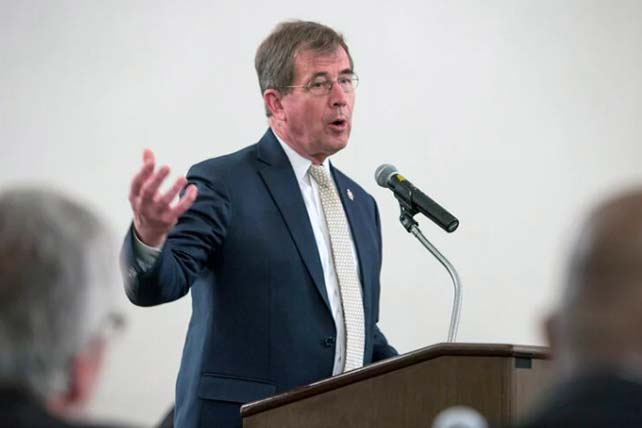(RNS) — Bishop Scott Jones isn’t the first United Methodist bishop to join the Global Methodist Church since the theologically conservative denomination launched in May, but his exit from the UMC has arguably caused the greatest stir.
That’s partly because of the unique position his family holds in Methodism and the “extreme center” position he had staked out within the United Methodist Church.
For some, it also casts a different light on his retirement, just days before he joined the GMC, as head of the Texas Annual Conference where about half of its churches — more than any other conference in the United Methodist Church — likewise left the denomination.
“The Jones family is truly one of the first families of Methodism in our church,” said Will Willimon, a retired United Methodist bishop and a professor of the practice of Christian ministry at Duke Divinity School in Durham, North Carolina.
RELATED: Some Churches Leave UMC Through Formal Process; Others Are Suing
Willimon added, “This family has been a family of leaders of our church, and it’s such a shock to have one of the members of the family leading churches out of our church.”
Jones’ late father, S. Jameson Jones, Jr., was president of the Iliff School of Theology in Denver and then dean of Duke Divinity School — two United Methodist schools.
His brother, L. Gregory Jones, now the president of Belmont University, previously served as dean of Duke Divinity School, arguably Methodism’s premier seminary.
And one of his three children, Arthur Jones, is senior pastor of a United Methodist Church: St. Andrew United Methodist Church in Plano, Texas, which is currently negotiating to leave the UMC.
Both Arthur Jones and Greg Jones declined to be interviewed for this article.
“So when you talk about family involvement, there is a lot of that,” Bishop Jones said, who after seminary got his Ph.D. in religious studies from Southern Methodist University in Dallas.
He wrote his dissertation on the history of biblical interpretation and John Wesley, one of the founders of Methodism, because, he said, “I recognized that how Christians interpret the Bible is the most controversial question in Christianity today.”
That question is at the heart of a controversy that has haunted the United Methodist Church for decades and has led to the current split: whether to ordain and marry LGBTQ Christians.
In 2020, delegates to the global UMC’s General Conference were expected to consider a proposal to split the denomination, but the meeting was subsequently delayed three times due to the pandemic. After the third pushback to 2024, the Global Methodist Church, which is against ordaining LGBTQ clergy and marrying same-sex couples, split from the United Methodist Church earlier this year.

